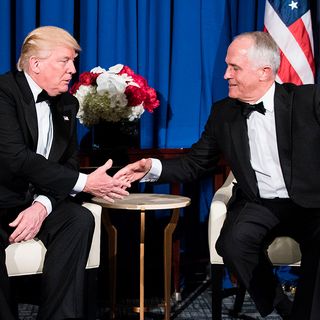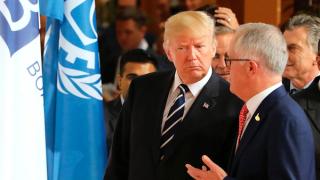Australian political leaders need to change how they engage with the US. The US congress has demonstrated overwhelming goodwill towards Australia this year. But it has not been reciprocated.
Australia’s engagement with the executive branch — the White House and cabinet secretaries — has been active and productive, as it has been for decades. But unlike their British and Canadian counterparts, Malcolm Turnbull, Foreign Minister Julie Bishop and Defence Minister Marise Payne have not visited Capitol Hill in the six months since Donald Trump became President.
Australian political leaders will need to build personal relationships with those who command the President’s attention, who will shape Trump’s decisions on critical regional and bilateral issues.
Trump’s “America first” foreign policy mantra and his administration’s idiosyncrasies demand a different approach to the playbook used by Coalition and Labor governments. The nature of the government under Trump does not reward the frequent, friendly and frank bureaucratic engagement that has underpinned US-Australia relations for decades.
Consequently, Australian political leaders will need to build personal relationships with those who command the President’s attention, who will shape Trump’s decisions on critical regional and bilateral issues. This set is broader than Trump’s family, his cabinet and the circle of friends and advisers. Congressional leaders are a key avenue of influence, too.
Make it personal: Trump, Congress and Australia’s avenues of influence

Congress is a co-equal branch of government that has assumed greater responsibility for shaping America’s role in the world under Trump. It has several blunt instruments at its disposal to influence and constrain the commander-in-chief’s actions, including legislation, sanctions, appropriations, reviewing personnel choices for government agencies, and voting on US trade agreements.
Congressional influence on foreign policy is highest when it is bipartisan. For example, the recent 98-2 Senate vote to impose new sanctions on Russia limits Trump’s ability to be too friendly towards Vladimir Putin.
A stark gap exists between Trump’s transactional approach to alliances and congress’s more traditional view of the global role and responsibilities of the US.
The striking absence of high-level meetings between Australian political leaders and congress this year — with the exception of senator John McCain’s trip to Canberra in May — represents a significant missed opportunity.
The British and Canadian governments clearly understand the importance of congress. Prime ministers Theresa May and Justin Trudeau have prioritised meeting representatives and senators from the outset of Trump’s presidency.
During her visit to Washington in January, May specifically travelled to Philadelphia to address all 280 Republican lawmakers. Trudeau, on a one-day trip to Washington, spent more than a quarter of his time with the two most important players in congress: House of Representatives Speaker Paul Ryan and Senate majority leader Mitch McConnell. The two countries’ foreign ministers have been even more active on Capitol Hill.
The striking absence of high-level meetings between Australian political leaders and congress this year — with the exception of senator John McCain’s trip to Canberra in May — represents a significant missed opportunity.
Australian leaders and senior ministers travelling to Washington should always do the rounds on Capitol Hill, as the Prime Minister did in January last year.For an Australian prime minister or senior minister, visiting congress is like pushing an open door. In the aftermath of the acrimonious Trump-Turnbull phone call in January this year, more than 60 members of congress contacted ambassador Joe Hockey to express their solidarity. Additionally, congress has revitalised its support for Australia, relaunching the Friends of Australia Congressional Caucus.
Critically for co-ordinating the US-Australia relationship and common global interests, the Trump administration has not yet nominated a candidate for the key Asia policy roles at the State or Defence departments, nor an ambassador to Australia.
The previous iteration of the caucus helped with the passage of the US-Australia free trade agreement in 2005. The senior bipartisan Senate leadership of the revitalised caucus gives every indication it could be similarly helpful for Australian interests.
In coming months, congress will vote on issues of critical importance to Australia, including the Pentagon’s budget and a proposed 30 per cent cut to the State Department.
Critically for co-ordinating the US-Australia relationship and common global interests, the Trump administration has not yet nominated a candidate for the key Asia policy roles at the State or Defence departments, nor an ambassador to Australia. The administration has just 49 political appointees in senior positions across the US government (22 of whom are Trump’s cabinet secretaries), compared with 203 confirmed at the same point in Barack Obama’s first term and 185 under George W. Bush.
This paucity of personnel, coupled with the absence of a typical inter-agency policy process and the President’s aversion to reading briefs, means that Australian bureaucratic engagement with US government officials counts for less than it did in the past.
The onus is on Australian political leaders. They will have to shoulder a greater burden for managing the US relationship, regularly meeting the cabinet secretaries and advisers who have the capacity to change the President’s thinking. Engagement with senior Trump administration figures will be key on issues such as the US’s Asia strategy, bilateral trade and a refugee deal that may yet encounter a speed bump or two.
In the Trump era, Australian political leaders need to go to Washington and make it personal.
Dougal Robinson's report Make it Personal: Trump, Congress and Australia’s Avenues of Influence was published by the US Studies Centre today.






